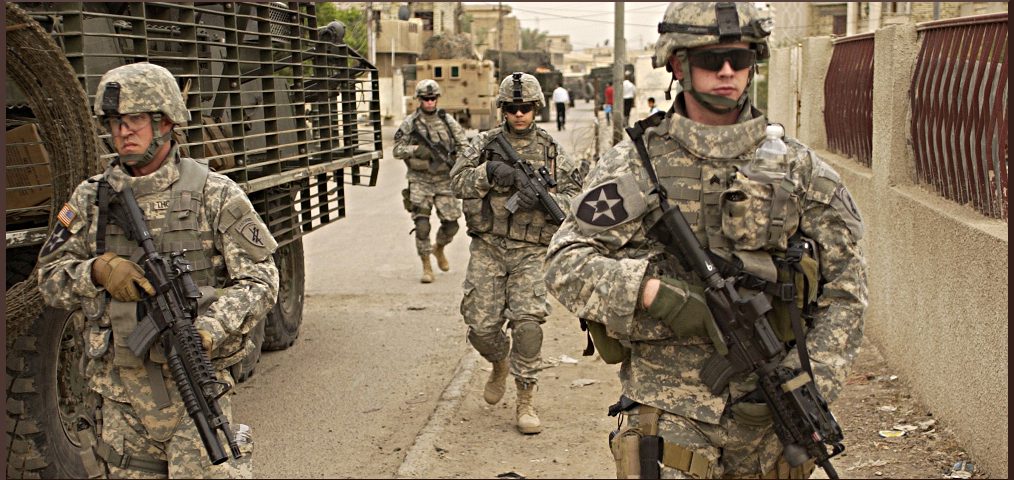Of Wars, Childhood and Guns: an Iraqi-American Woman’s Plea for Change
Guest Post by Tiba Fatli
At the age of 13, my family packed our belongings (one small bag each) and fled Iraq headed towards Syria. As a non-white naturalized American citizen, I am often asked mostly by strangers ‘where I am from,’ which is almost always followed by daunting questions about my personal and private life. I manage to either redirect the topic, nod to proposed speculations or provide the shortest answer I can think of. This is because these questions are either brought up in a context of exotifying and/or pitying my refugee journey and arrival to the US; or people often have their own perspectives and look to reaffirm them through my story. But, most importantly, I don’t answer them because these are personal and intimate details about my life that, unless voluntarily expressed in a specific context, should not be asked.
Another reason for my willful avoidance of personal questions is because my memories of Iraq and the war are blurred. Perhaps, I have intentionally shut them down and chose to not remember them. What doesn’t leave my mind, however, is waking up and sleeping to gun shots and bombs, and the strange, tall, and armed foreigners who occupied my land and camped outside of my school to ‘protect it’—The US military. My elementary school was in close proximity to a military base and a bustan (orchard) that was home to Al Qaeda. There were in constant fire exchanges between the US military, terrorist, and Iraqi militia groups. As a result, many Iraqi children were forced to drop out of school for safety reasons. Education to my family was critical, and thus, I continued to attend classes whenever possible.
After I lucked out and received resettlement to the US (less than 1% of refugees are resettled), memories of gun violence haunted me with the increase in gun shootings in US schools. The more I learnt about the gruesome and bloody conception of America and its violent culture that is entertained by and engaged with violence, the less surprised I was about its gun violence epidemic. American’s violent culture nurtures its grossly high gun violence. According to Philip Bump of the Washington Post, Since 2000, over 188 shootings at schools and universities caused by armed individuals killing around 200 students and injuring at least another 200. Every time a shooting occurs, I am forced to recall my fragmented and blurred memories of the Iraq war. In comparison with the highest rates of violent gun deaths in North African and the Middle East (MENA), the US rate is worse than most MENA countries with casualties due to armed conflicts factored out. For a so-called ‘developed country’ these numbers are appalling and terrifying. Oddly enough, these incidents make my life in Iraq and the US not that much different. In both cases, images of Americans with guns haunt me and I am as worried about my young family members who are in the US as I am about those in Baghdad. I am also perplexed as to why it has taken the US longer to bring down the governance of Saddam Hussein, and enforce an alternative path to governance and development, then it has taken in changing its gun laws and addressing gun violence. This is, of course, not limited to the case of regime change in Iraq.
Writing this piece was not easy as I do not like to speak of my personal and private life, especially one that concerns my refugee journey. But I think it is important for me to share my experience as someone who has experienced violence in their childhood and was terrified to step outside my childhood home and walk to school. I will not get into the details of why arming teachers will not work, as many already have, but I will say that trained armed US military did not make me feel safe in Iraq and nor does the idea of armed teachers or security guards in the US put me at ease. The US does not only have to seriously consider comprehensive reforms to its gun laws that, yes, take guns away from people, but it also needs a grim look at its violent culture. Why would someone in a ‘developed’ country need to have a gun to feel safe? Why do Americans pose in pride with their firearms?
Our young generation is leading a movement on gun-control and I think have the potential of starting to challenge America’s violent culture. We need to listen to children who are leading the movement on gun-control.
Tiba Fatli is an MA student and Research Assistant at the Migration and Refugee Center, American University in Cairo. You can reacher her at Tiba.fatli(at)gmail.com or tfatli(at)aucegypt.edu
